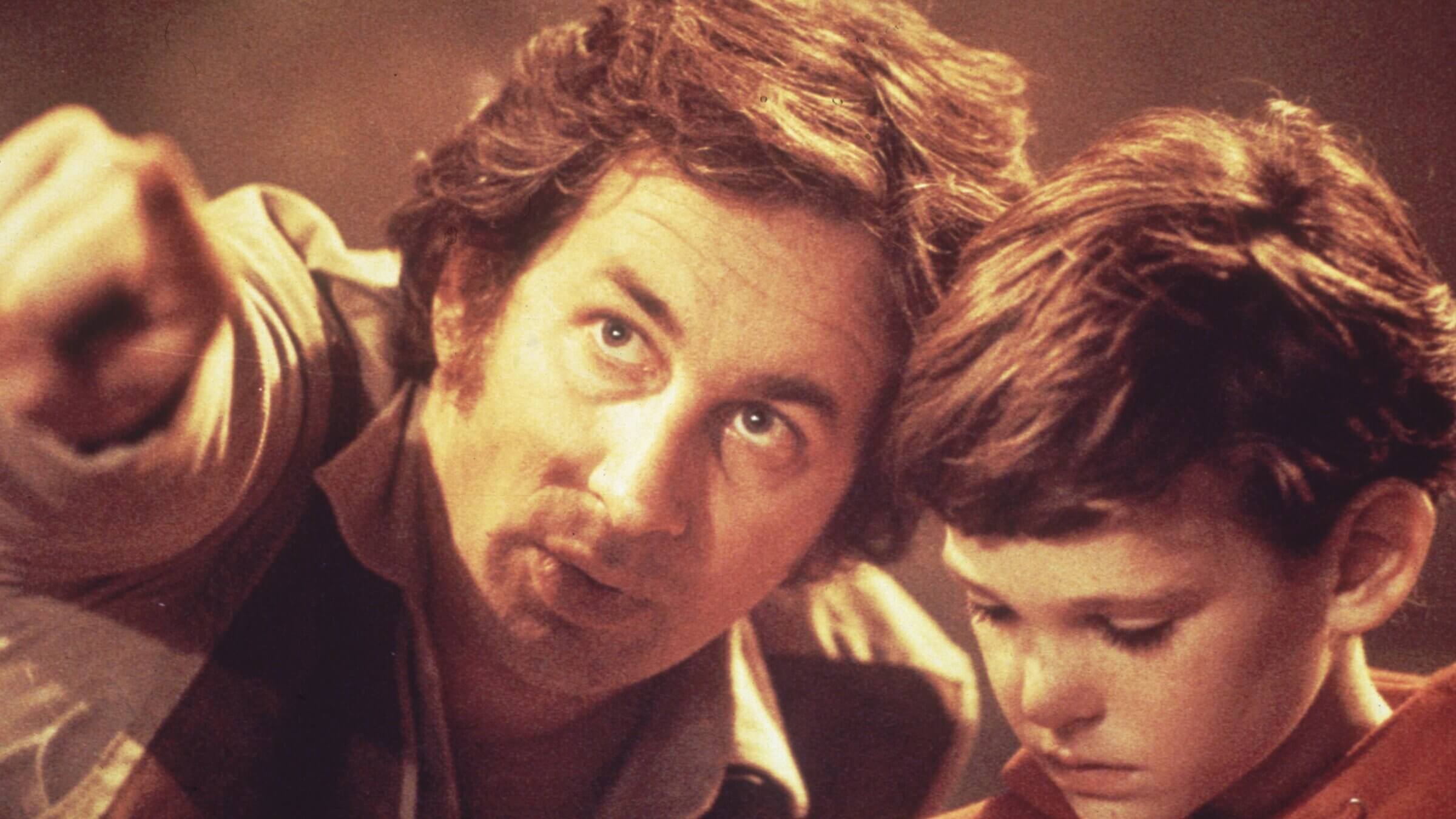Steven Spielberg’s long ride down memory lane is a Jewish boy’s dream movie — literally
The ‘Fabelmans’ is mesmerizing — before it goes off the rails

Steven Spielberg directs Henry Thomas in “E.T.” Photo by Getty Images
In 1952, a 5-year-old Sammy Fabelman (or was it Steven Spielberg) saw a train crash.
His parents both assured him it wasn’t real. His father, an engineer, explained it by describing the mechanics of a film projector. His mother, a free spirit and would-be concert pianist, was more fanciful: “Movies are dreams,” she said.
This is the sparkling beginning of Spielberg’s long-stewing “The Fabelmans,” a film that’s scope is ambitious even for the inventor of the blockbuster. Its human spirit and largesse live up to his best work, but in the end, it hews too close to home to cohere. In its efforts to be comprehensive, it is more a dream than a well-engineered narrative — sumptuous, deeply felt and ultimately illogical.
After Sammy sees the train crash (a sequence from “The Greatest Show on Earth”), he’s given a new Lionel train car for each night of Hanukkah. Soon he sets to work recreating the scene, positioning a figure of Noah and his ark full of animals on the track for a head-on collision. Mitzi (Michelle Williams as a version of Spielberg’s mother, Leah) tells Burt (Paul Dano, playing Arnold Spielberg) that Sammy is trying to “get some kind of control” over this scary spectacle. Her solution is to have him film it, placing Sammy on a path toward wunderkind auteur and giving Spielberg his thesis: that the act of creation is a way to make sense of the world.
If you’ve seen Susan Lacy’s documentary “Spielberg,” the first two-thirds of the film may seem familiar. Spielberg reshot his old 8 and 16 mm home movies and, like Alfonso Cuaron in “Roma” or Fellini in “Amarcord,” recreated his childhood down to the wallpaper. When we discover a teenage Sammy (Gabriel LaBelle), having relocated with the family from New Jersey to Arizona, he proves himself to be a blend of his Peter Pan mother and his technically minded father.
With his Boy Scout friends, he rigs ditches with seesaws to fling dirt during a battle scene (a trick J.J. Abrams mentions in Lacy’s film, wonderfully demonstrated here). Distressed by the phoniness of a shootout in a Western, he punches his film strip with a pin to create the illusion of muzzle flashes (“thinking like an engineer!” Burt praises).
These moments, and the lively, “E.T.”-esque dinner table scenes— here with kugel, challah and even matzo brei — are highlights. They’re the good times, and Spielberg and co-writer Tony Kushner relish them, even as trouble waits in the wings.
When Sammy edits footage of a family camping trip, he discovers that Mitzi and Burt’s best friend, the kids’ “Uncle” Bennie (Seth Rogen), are in love. Enter the therapy section of our programming.
The film begins to sour, as did Spielberg’s home life, when the scene jumps to Northern California, a land of towering goyishe monsters (“giant sequoia people,” Sammy calls them) and high school torment. As Burt and Mitzi’s relationship deteriorates, Sammy is called the k-word and a bully hangs a bagel (labeled “Jew Hole”) in his locker. Sammy stops making movies, forcing the film into ever stranger, broader subplots before a final anticlimax.
A Christian girlfriend proselytizes Sammy as a pretext for make-out sessions (there’s much discussion of the Holy Spirit “coming into” her). A monkey joins the Fabelman clan (Leah did, in fact, buy a monkey). When Mitzi and Burt’s marriage ends, Sammy is cutting together silly footage from a high school senior “skip day” at the beach, which his sister watches with tears in her eyes. It’s a bizarre third act both for what it presents and chooses to omit.
Many familiar with Spielberg or his Daddy Issue Series — “Hook,” “Indiana Jones and the Last Crusade,” “Close Encounters of the Third Kind,” “Catch Me If You Can,” “War of the Worlds,” “E.T.” and plenty more — know that Arnold bore the brunt of Spielberg’s angst over the divorce, leading to a 15-year estrangement. Yet here, Spielberg largely sides with him, focusing his resentment on his mother, the commanding center of the film and the figure whose spirit looms largest.
Whether he’s being evasive or showing a new side of the conflict, the departure tells us something. Spielberg, no matter how earnestly he’d like to grapple with his personal history, is more forthcoming within the conventions of genre.
Despite all the meticulous set dressing and the roman-à-clef cast of characrers — excellent to a one — nothing comes near a moment in “Close Encounters,” when Roy Neary’s son screams “crybaby” at his overwhelmed father. That was something Spielberg did to Arnold, and that was perhaps too cruel to include here, with his own counterpart reenacting it.
Elsewhere, the fact that something happened is license for inclusion — did you know he met John Ford? That he had an eccentric great-uncle (Judd Hirsch, embodying more Yiddishkeit than whole Upper West Side apartment blocks)? That there are glimmers of fantasy threaded throughout is not enough to draw all these pieces together (or even, in this reality, explain why Hanukkah and Christmas fell on a January in 1952).
The disconnect returns to the tension, or rather the choice, presented in the opening moments: to view cinema as something mechanical or the stuff of dreams. Despite a marriage’s dissolution, Spielberg is a union of both ideas.
Still with us is the greater motive, the need to create, to make sense of a biography through a viewfinder and be in command of a narrative.
“When I was able to say ‘action’ and ‘cut’ I wrested control of my life,” Spielberg said in Lacy’s documentary.
When the subject is his life, the control falters. When it gets out of his hands it’s a beautiful train wreck, but a train wreck nonetheless.

















